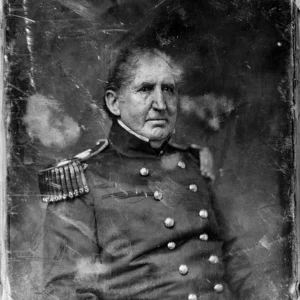A cool, crisp late October night. A haunting moon shining down as a breeze rattles the bare tree limbs. It’s the ideal time to curl up and revisit Washington Irving’s classic “The Legend of Sleepy Hollow.” The beloved short story has been making spines tingle since 1820.
Who doesn’t know the tale of the terrifying Headless Horseman scaring the daylights out of poor, hapless Ichabod Crane?
But did you know Ichabod Crane really existed?
No, not the gangly, cowardly, scarecrow-like schoolteacher from Irving’s story. It’s time to meet the real Ichabod Crane.
Ichabod B. Crane was born in 1787. He did a hitch in the Marines aboard the famous warship USS United States under the legendary Commodore Stephen Decatur and later served as an Army captain at Sacket’s Harbor on Lake Ontario in the War of 1812. There he oversaw defenses at Fort Pike. He was personally brave and courageous under fire, totally unlike the faint-hearted Crane in the story.
While at Fort Pike he may, or may not (historians disagree on this), have crossed paths with a staff officer named Washington Irving. One way or another, the young writer certainly heard Crane’s name and it stuck with him. Irving already had a thing for traditional “Yankee-sounding names,” as he put it. They consisted of a first name taken from the Bible (in this case Ichabod is mentioned in the book of First Samuel) paired with a common English surname. So, he mentally filed away “Ichabod Crane” for later use.
The real Crane went on to serve in both the Black Hawk and Mexican Wars, eventually retiring after 45 years as a highly respected colonel. He died at his Staten Island home in 1857.
Since the fictitious Ichabod Crane had nothing in common with the real military officer, where did Irving get the character’s personality? Scholars again are divided, but it seems most likely it was based on one Jesse Merwin. He was a real-life schoolmaster in Kinderhook, N.Y. The two men supposedly became friends when the writer was living there in 1809. They remained pen pals for decades after Irving moved away.
Ironically, the modern structure that sits on the same site Merwin’s schoolhouse once occupied is home to the Ichabod Crane Central School District.
Getting back to the real military officer, he seems not to have minded seeing his name turn up in the story. Irving was a popular author whose books sold very well. There were only so many people at the time running around named Ichabod Crane, after all, and one imagines he must have grown tired of hearing during introductions, “You can’t be that gutless wonder in the book—you’ve still got your head!” Few things in life are as unpleasant as laughing at a tired line one has heard too many times. But Col. Crane seems to have borne it all in good stride.
Washington Irving’s literary legacy still lingers in many ways. For instance, he popularized the image of Santa Claus flying through the sky on Christmas Eve night in his early short stories. He coined the phrase “the almighty dollar” and spread the use of “Gotham” for New York City.
And another Irving character also lives with us today. His fictional Deidrich Knickerbocker became so widely associated with New York that its residents were called “Knickerbockers” in the 19th century. That became the nickname of the NBA’s New York Knickerbockers, now shortened to the Knicks.
We can be grateful they weren’t called the New York Ichabods. Who wants to cheer for the Icks?

